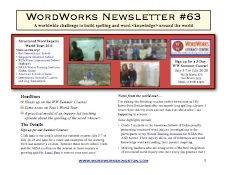

WordWorks Newsletter #63 & Classroom Video
A worldwide challenge to build spelling and word knowledge
through structured word inquiry of the word <know>!
The main feature of this newsletter is a model of an inquiry-led teaching episode that starts with a question about the spelling of the word <know>. As a way to encourage teachers to share learning and teaching ideas, I am challenging schools to take advantage of the ideas and resources presented here to have teachers from all grades take on aspects of this lesson all at the same time. The newsletter points to many free resources and ideas to support investigating the conventions that explain the spelling of <know> and countless other words.
Suzanne Voigt, a Grade 2 teacher from the International School of Beijing is the first teacher to share images from her class that took on this challenge. See images from her class below. Some are incorporated into the video below also!
I also recently posted the video (below) of me investigating the spelling of <know> in a Grade 1 and a Grade 2/3 class.
This Newsletter also follows up on Pete’s trip to schools in Indonesia, Bahrain, Qatar and Switzerland and his workshops for the 2011 NESA Winter Institutes in Doha. You will read stories from classes doing amazing work in all of these schools. This lessons in this video took place in Luzern. See a slide show from that world tour at this link.
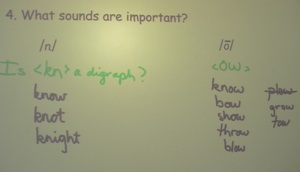
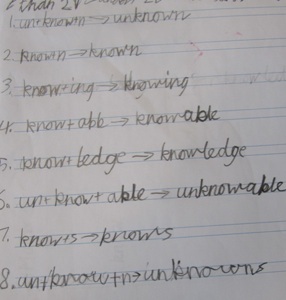
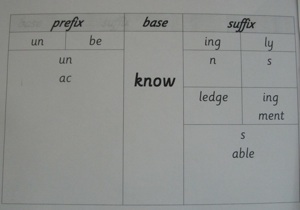
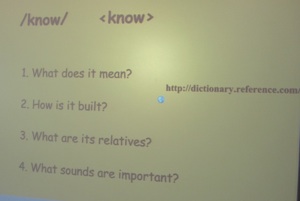
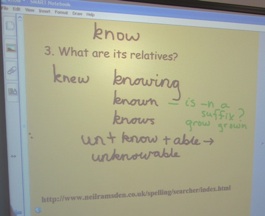

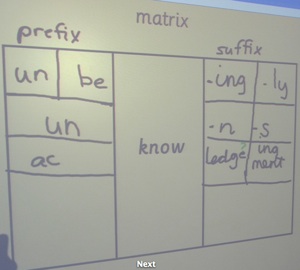
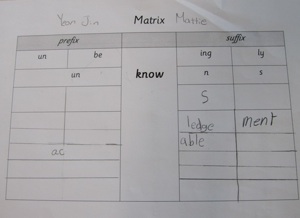
A Grade 2 teacher and her class in Beijing take on the word <knowledge> challenge!
Below are spectacular images of work from Suzanna Voigt’s Grade 2 Class that took up the challenge to study the spelling system by investigating the spelling of the word <know>. Please contact Pete to share pictures and stories of work with your students. You can also share work and see other free resources related to the spelling of <know> login at www.realspellers.org. Under “Resources” look for “Lesson Plans” and click on “Pete’s <know> Lesson”
This video provides an example of taking part of the lesson described in Newsletter #63 and putting it into practice in a Grade 1 and a Grade 2/3 class. The video shows clips of me using members of the family of the base <know>, word sums and the matrix to investigate how spelling works. I also use this video to emphasize that proper use of word sums targets the teaching of graphemes as much as morphological structure.
I hope this video (and others in the future) help teachers get a sense of what structured word inquiry i can look like in the classroom. This video and the accompanying resources (below) should be taken as just one way these tools can be used in the classroom. I hope these resources spark a wide variety of ideas for teaching that remain linked by the goal of of targeting accurate orthographic understanding through scientific inquiry.
As a shining example of teachers making structured word inquiry their own, visit this blog of Jen Munnerlyn, literacy coach at the American Community School of Abu Dhabi where I will visit in November. Jen brought a team to the NESA workshop and then supported their whole staff by teaching a lesson based on the Real Spelling Theme “Learning From Love” in every class from Kindergarten to Grade 5! Her video models a real learner investigating spelling with students of all ages. It is spectacular.
Below are resources to help teachers with all of these lessons...
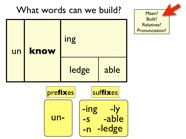
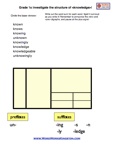
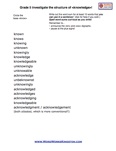
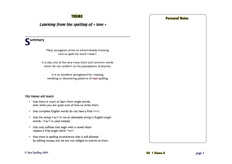

This image shows me using the Keynote file above to lead the session.
Contacts for WordWorks 2011 Winter Spelling Tour
With their kind permission, I have posted email contacts for NESA and the schools on this trip. Feel free to contact any and all to get their account of the effect of these workshops.
In order of the workshops...
-
•Krista Zavits, Principal, Bali International School
-
•Louise Perdena, Director of Curriculum, Singapore American School
-
•Dorothy Loveland (principal) and Fiona Al Rowaie (Literacy Coach), Riffa Views International School, Bahrain
-
•David Chojnacki, Executive Director, NESA
-
•Gail Saey, Director of Curriculum and Professional Learning, American School of Doha
-
•Gary Langenhuizen (principal), Jacinta Janssens (PYP Co-ordinator, Zug), Maria Häberli (PYP Curriculum Co-ordinator Zug & Luzern)International School of Zug & Luzern
Click here for a related article on backwards design of the UBD and structured word inquiry.

